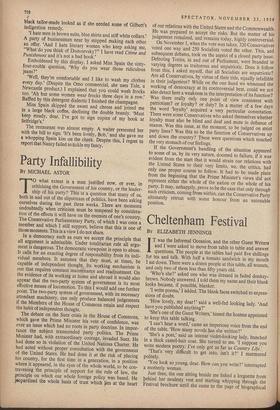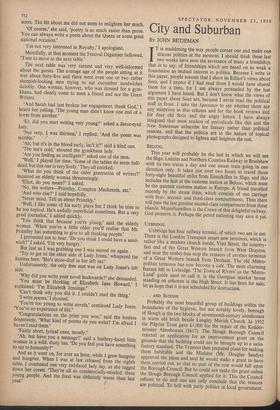Cheltenham Festival
BY ELIZABETH JENNINGS IT was the Informal Occasion, and the other Guest Writers and I were asked to move from table to table and answer questions. The people at the tables had paid five shillings for tea and talk. With half a tomato sandwich in my mouth I sat down. There were a dozen people at this table, all women, and only two of them less than fifty years old.
'Who's she?' asked one who was dressed in faded donkey- brown. Nobody answered. I told them my name and their blank looks became, if possible, blanker.
'I write poems,' 1 added. The blank faces switched to expres- sions of doubt.
`How lovely, my dear!' said a well-fed looking lady. 'And have you published anything?'
'She's one of the Guest Writers,' hissed the hostess appointed to keep this table talking.
'I can't hear a word,' came an imperious voice from the end of the table. 'How many novels has she written?'
`She's a poet,' said an intense violet-looking- lady, hunched in a thick camel-hair coat. She turned to me. '1 suppose you write modern poetry. I've only got as far as Country Life.'
'That's very difficult to get into, isn't it?' I murmured politely.
`You look so young, dear. How can you write?' interrupted a motherly woman.
Just then, the one sitting beside me fished a lorgnette from behind her modesty vest and starting whipping through the Festival brochure until she came to the page of biographical notes. The bit about me did not seem to enlighten her much.
'Of course,' she said, 'poetry is so much easier than prose. You can always write a poem about the Queen or some great national occasion.'
'I'm not very interested in Royalty,' I apologised.
Mercifully, at that moment the Festival Organiser bellowed, `Time to move to the next table.'
The next table was very earnest and very well-informed about the guests. The average age of the people sitting at it was about forty-five and there were even one or two rather sheepish-looking men trying to eat cucumber sandwiches daintily. One woman, however, who was dressed for a gym- khana, had clearly come to meet a friend and not the Guest Writers.
'And Sarah had just broken her engagement, thank God,' 1 heard her yelling. 'The young man didn't know one end of a horse from another.'
`Er, did you start writing very young?' asked a, fierce-eyed lady.
'Not very. 1 was thirteen,' I replied. 'And the poem was terrible.'
`Ah, but it's in the blood early, isn't it?' said a kind one. `The tea's cold,' shouted the gymkhana lady.
`Are you finding us intelligent?' asked one of the men. `Well,' I played for time. 'Some of the tables do seem half- dead, but this one is very lively.' They all smirked.
`What do you think of the older generation of writers?' inquired an elderly woman threateningly.
`Eliot, do you mean?' I asked.
`No, the writers—Priestley, Compton Mackenzie, etc.' `And who else?' I said hopefully.
`Never mind. Tell us about Priestley.'
`Well, I like some of his early plays but I think he tries to be too topical. He's awfully superficial sometimes. But a very good journalist,' I added quickly.
`You think that because you're young,' said the elderly woman. 'When you're a little older you'll realise that Mr. Priestley has something to give to all thinking people.'
I pretended not to hear. `Do you think I could have a sand- wich?' I asked. `I'm very hungry.'
But just as I was grabbing one I was moved on again. `Try to get to the other side of Lady Jones,' whispered the hostess here. 'She's stone-deaf in her left ear.'
Unfortunately, the only free seat was on Lady Jones's left side.
`Why did you write your novel backwards?' she demanded. `You must be thinking of Elizabeth Jane Howard,' I explained. `I'm Elizabeth Jennings.'
`Can't think why you did it. I couldn't read the thing.'
`I write poems,' I shouted.
`You're too young to write novels,' continued Lady Jones. `You've no experience of life.'
`Congratulations on the prize you won,' said the hostess desperately. 'What kind of poems do you write? I'm afraid I haven't read them.'
`Fairly short, lyrical ones, mostly.'
`Ah, but have you a message?' said a leathery-faced little woman in a wild, dusty hat. 'Do you feel you have something to say to humanity?'
And so it went on, for over an hour, while I grew hungrier and hungrier. When I was at last released from the eighth table, I overheard one very red-faced lady day, as she tugged down her corset. 'They're all so commercially-minded, these young people. And the food was definitely worse than last year.'











































































 Previous page
Previous page